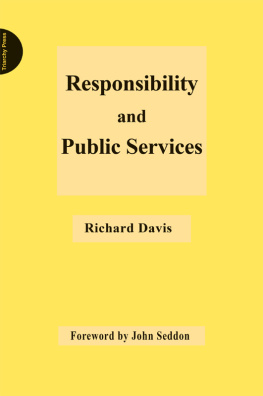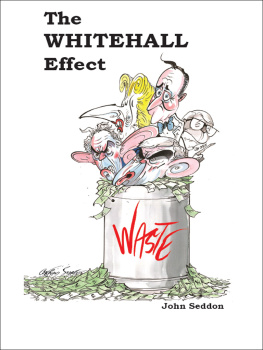50 Shades of Greed:
The Services SETA, Warts & All
Ivor Blumenthal, PhD

First published by Jacana Media (Pty) Ltd in 2013
10 Orange Street
Sunnyside
Auckland Park 2092
South Africa
+2711 628 3200
www.jacana.co.za
Ivor Blumenthal, 2013
All rights reserved.
ISBN 978-1-4314-0845-0
Also available as an e-book
d-PDF ISBN 978-1-4314-0846-7
ePUB ISBN 978-1-4314-0847-4
mobi ISBN 978-1-4314-0848-1
Cover design by publicide
Job no. 002081
See a complete list of Jacana titles at www.jacana.co.za
I would like to dedicate this book to my loving family. My wife Robyn, who is always far more professional, together and circumspect than I could ever be and my guiding light. My daughters Natalia and Aylit and my son Adiv, who each need to understand the unbelievable opportunity I had to serve my country using my capacity to do so and how rare an opportunity that was. It is that rarest of opportunities I wish for them. My family stood by me as my tenure at the Services SETA proceeded, and were there to pick up the pieces of my emotional downward slide when the organisation I partially built was taken away from me. It sounds trite but it was images of that family that kept me going as the only light in a very dark tunnel.
Contents
Why now, after three years in the wilderness has Dr Blumenthal chosen to pen this book? What are the lessons he wants to impart and the warnings he wants to place in the public domain?
As SA changed into a true democracy, its newly invested government quickly set to work on revamping an Education and Training system which was clearly inappropriate for the New South Africa.
Of the 25 SETAs, the Services SETA was the one that was clearly under-resourced in terms not only of actual infrastructure but the necessary culture of education, training and development. This chapters focus is on what was required to position the Services SETA to deliver.
It is easier to accomplish what is required when you are disregarded and not taken seriously and therefore when expectations are minimal. This is possibly one of the primary reasons for the Services SETAs success. People had very low expectations, if any, that the Services SETA would be anything other than a repository for misfit semi-industries.
If you serve the private sector, then it makes no sense to benchmark, conform with and speak the language of the public sector. This is a recipe for disaster and explains why there is such an abject disjuncture in South Africa between the business community and government.
To be taken seriously in the private sector requires the adoption of a platform of governance that mirrors that found in any private company be it listed or unlisted. That is why the Services SETA set about applying private sector standards of good governance in how it managed its affairs.
The Services SETA was the first SETA, indeed governmental organisation, to understand the importance of decentralisation and ensuring that all provinces had a say in and a share of all national priorities.
With over 1 000 acronyms and a completely novel culture being developed by those involved in skills development, it was essential to implement an efficient and professional approach to effective communication with stakeholders. This was not always a scientific and perfect pursuit.
If the Services SETA excelled at one thing, it was innovation. Large numbers of innovative projects in the domain of skills development were possible owing to the environment enabled by the various Ministers of Labour between the years 1997 and 2010.
Many lessons were learned locally and internationally as CEO of what ultimately became the most progressive and innovative organisation in government and particularly in skills development. The results serve as a guide of what is productive and what should not be encouraged.
Ultimately it boiled down to people the types of people and their various interactions. Human nature has much to teach us as it is correlated to success or failure.
Would it be done again on a similar path? In a heartbeat.
Introduction
DENIAL AINT JUST A RIVER IN EGYPT.
MARK TWAIN
A t the beginning of 2011, the Services Sector Education and Training Authority (SETA) found itself at war with its own Ministry. One of 23 SETAs, it seemed that we were the only one that had a problem with how the new Minister of Higher Education and Training had decided to operationalise his recently acquired responsibility for the SETA structures.
The SETAs had been transferred from the Department of Labour to the new Department of Higher Education and Training. This Department had been created to be distinct from the Department of Education, which continued to exist as a stand-alone department.
Minister Blade Nzimande and I had never met directly. We did not know each other and yet, unfortunately, the war that ensued became the BladeBlumenthal pony fight, rather than the battle between right and wrong. Between legal and illegal.
The contestation was about who owned the skills levy, who had a right to use it, what it should be used for, how the SETAs should be governed and the process adopted by the Minister in the course of his proceeding to take over the SETAs.
What is this book not about?
This book is not about that contestation. It is not about the original two cases taken to the Labour Court, which found in favour of the pre-existing Services SETA Council and against the Minister, with costs. It is not about the two appeals lodged by the Department of Higher Education and Training that were thrown out of court with costs again awarded against the Department. It is not about the orders for performance granted against the Department and the Minister compelling the Rule of Law to take precedence in the face of the blatant disregard for the Labour Courts various rulings and directives.
It is not about the final petition to the Judge President which was raised by the Department of Higher Education and Training when all procedural appeals were lost to them.
It is not about the fact that the various judges all recognised that the Minister had changed SETA constitutions illegally and had replaced legitimate pre-existing boards incorrectly. It is not about the obvious disregard for the Rule of Law by the Minister in the face of repeated court judgments, pronouncements and orders compelling him to perform in terms of those findings. Consequently, it is not about the fact that what was found to be an illegal takeover of these legitimately structured semi-statutory bodies applies as a constant rule to all other SETAs and therefore potentially invalidates not only the departmentally imposed governance and decision-making structures of those other SETAs as it does of the Services SETA, but importantly calls into question the legitimacy of the disbursement of funds among the now 21 SETAs since those court judgments were made in 2011. It is not about the money the R5-billion-a-year kitty that is possibly being funnelled away from legitimate levy-paying recipients.
If not about those issues, then what is it about?
This book is about more important things than the hijacking of the SETA landscape and the redirection of levy income. It is written to contest the Ministers repeated insistence that stakeholders, elected legitimately in terms of the constitutions found by the courts to be so legitimate, should not participate in governing structures because of what he perceives to be conflicts of interest, and his insistence that his own nominees take the reins at the SETAs, which now number 21 from the 23 that existed prior to his taking over.













